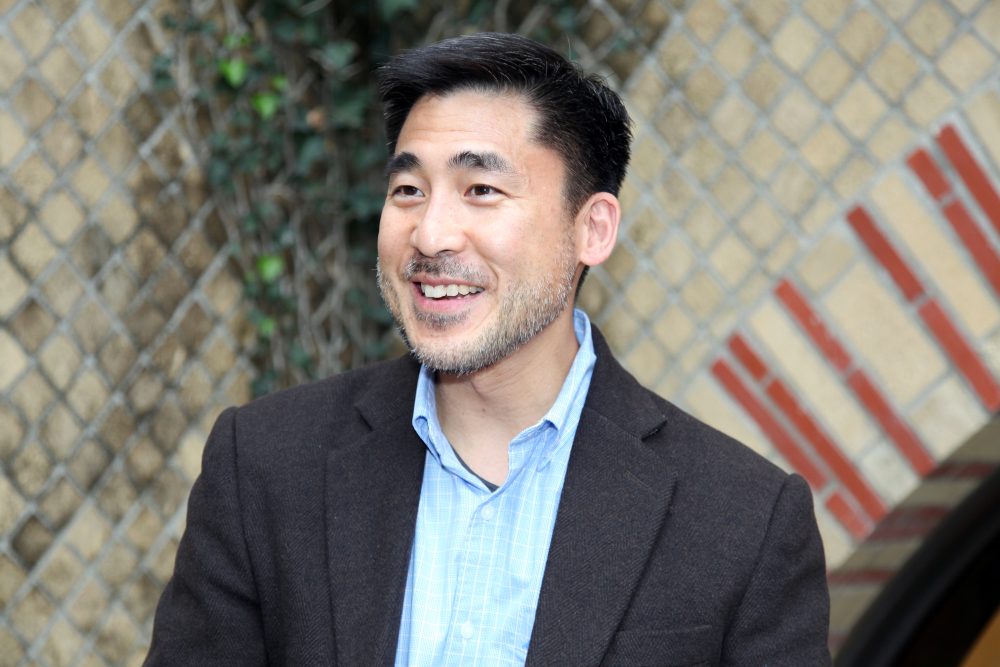
Photo by Aaron Salcido.
Scott Tong is a sustainability reporter for public radio’s Marketplace. Before moderating a Zócalo/Getty Villa panel discussion titled “What Can the Ancient World Teach Us About Living Sustainably?” at the Getty Villa, he spoke in the green room about living in Shanghai, reading The Handmaid’s Tale, and playing middle-aged dad soccer.
Do you have hobbies?
Yes. Since I’m on the sustainability desk, I have to be a cyclist. So my cutoff is 45 degrees [Fahrenheit]: When it’s over 45, I’m on my way on my bike to work. I live in Arlington, Virginia, and it’s about 45 minutes into downtown Washington, D.C. That’s kind of my unplugging that I look forward to the most. It creates a little bit more brain space. And I have three kids, three soccer players, and then Tuesday night is when I get to play, and hopefully don’t break anything. So I play just middle-aged dad soccer.
I’m guessing you’re an attacking midfielder.
Anywhere they’ll take me! I was a defender, actually, just trying to get in front of the attackers. And then we do a big, long charity walk every year, so my wife and I get out and we get to do 30 miles in two days, for multiple sclerosis. My wife has MS, so this is our kind of cause. So we find different ways to get outside, I guess, is the hobby.
Was there a teacher or professor who really influenced you?
So I graduated from Georgetown in ’91, and I took a number of classes from a China historian named Nancy Burkopf Tucker. She was a foreign service officer in China for a little bit, and I thought, “Oh, that sounds interesting”—at Georgetown everybody wants to be a diplomat, and you think about that. And then there was a lot of Cold War stuff happening. We were all focused on the Soviet Union, and the Berlin Wall fell while I was in college. And she said, “You know, a lot of fascinating stuff is happening in China, that a lot of the world isn’t paying much attention to. You might want to think about being a journalist in China. It took about 20 years for me to make it happen, and in 2006 I worked for Marketplace and they shipped me and my family off to there. We were there 2006 to 2010. So maybe she planted the first seed.
You were in Shanghai. What do you miss and not miss about living there?
Shanghai is an adventure every day. The extremes of pleasure and displeasure, of something going great and going crazy, it’s just on a greater scale. You can be in traffic for four hours, and at the same time have this just fascinating conversation with the dumpling seller who lived through the worst famine in human history, and talking to him about eating tree bark in 1960. These are people who’ve lived through this kind of tumultuous history, this instability, that it’s hard for Americans, for me, to really kind of get my head around. I miss that, and I miss kind of seeing myself from the outside, and all of these assumptions that we Americans bring, and we really get tested when we’re on the outside.
If you could time travel, where and when would you go?
So in the course of writing this book about China, it connects to my family history. It profiles five people across five generations in my family tree, kind of an economic memoir to try to tell this longer story of how today’s China arrived.
When did your family leave China?
My parents got out when the communists came in 1949. My dad was 10 and he went to Taiwan, and my mom was seven and her family went to Shanghai. And my mother’s father—this is the period I would want to go back to—her father stayed back, and he was captured as a political prisoner, and then he went to the gulag, the labor camps in China. So I want to go back and talk to him about the decisions he made in the fog of war, the sides he chose.
But you said this goes back five generations?
It goes back to the late 1800s. My grandfather was the first out of the village, where everybody has the same last name as me, in Jiangsu Province, along the longest canal in the world. I would want to go back to that as well. My grandfather was a scholar, so he went out to the most modern place, to connect with the modern ideas at the time, and that was Japan. And he was one of the early scholars to learn about the –isms of today, Darwinism and feminism and Marxism and empiricism, and all these things that China came late to, and he got to be on the front lines of these new ideas, new seeds to bring back and sprinkle on Chinese soil.
What are you reading right now?
Our book club is reading The Handmaid’s Tale. It’s hard to not connect it to questions of the present right now.



